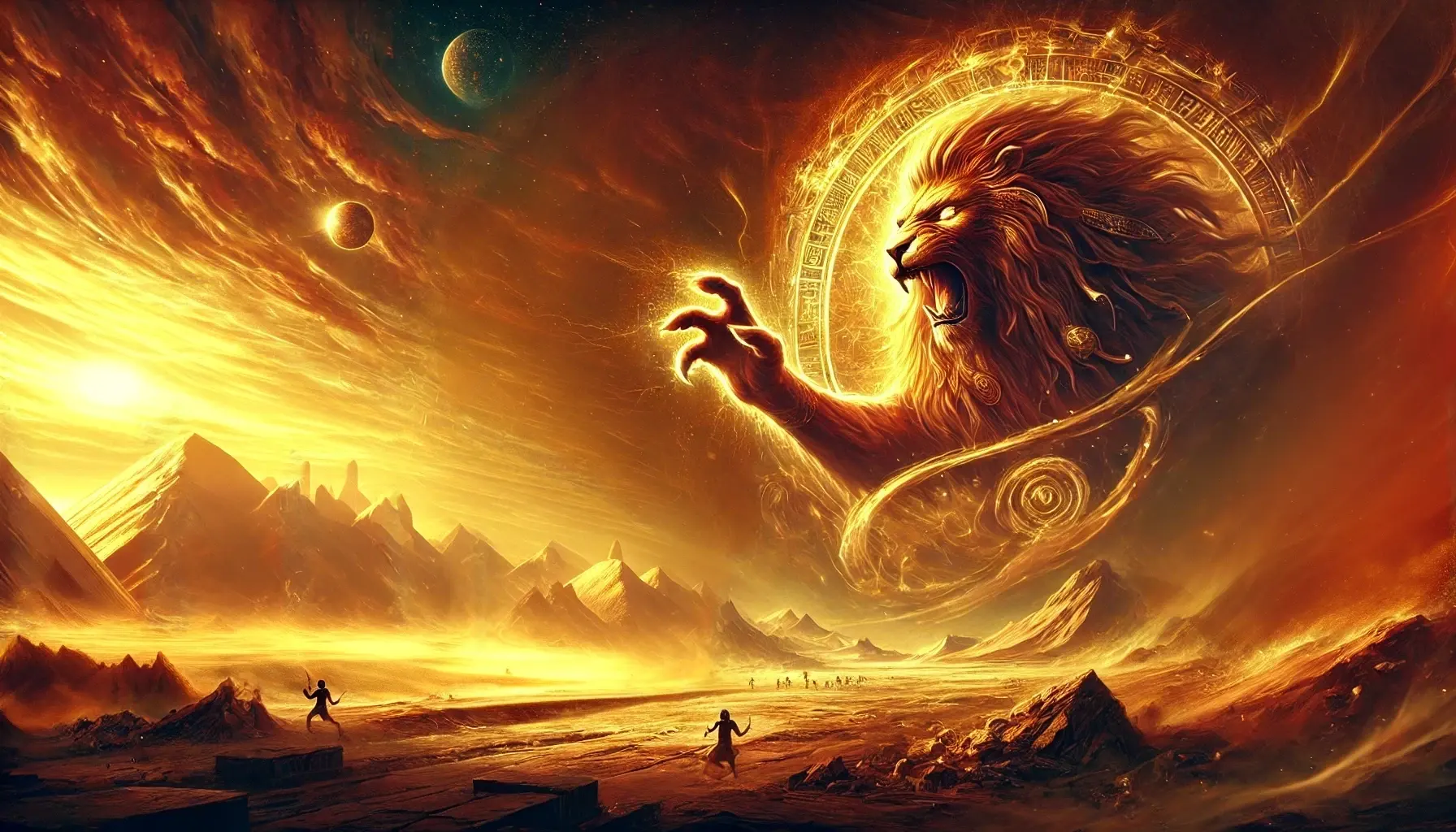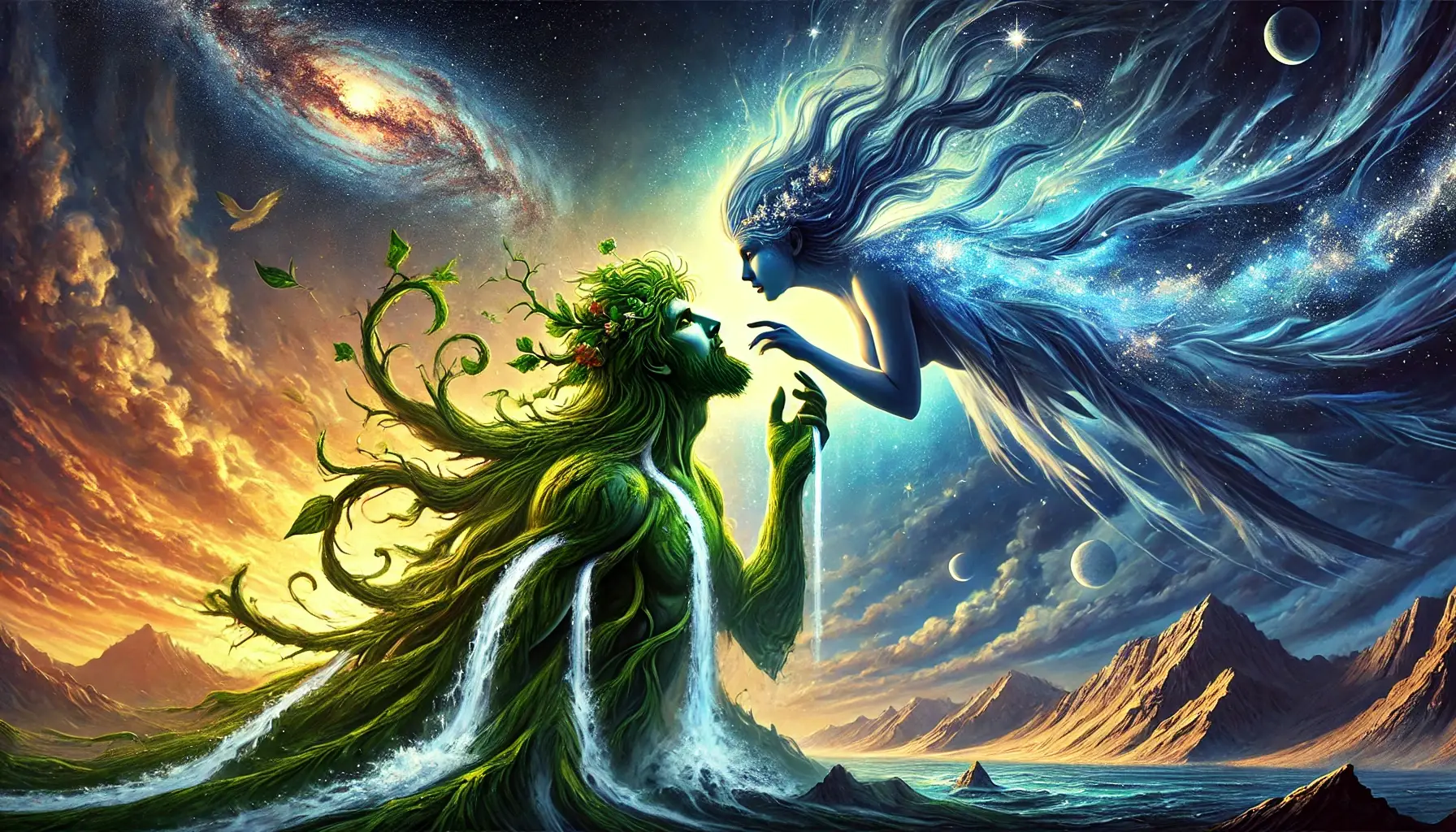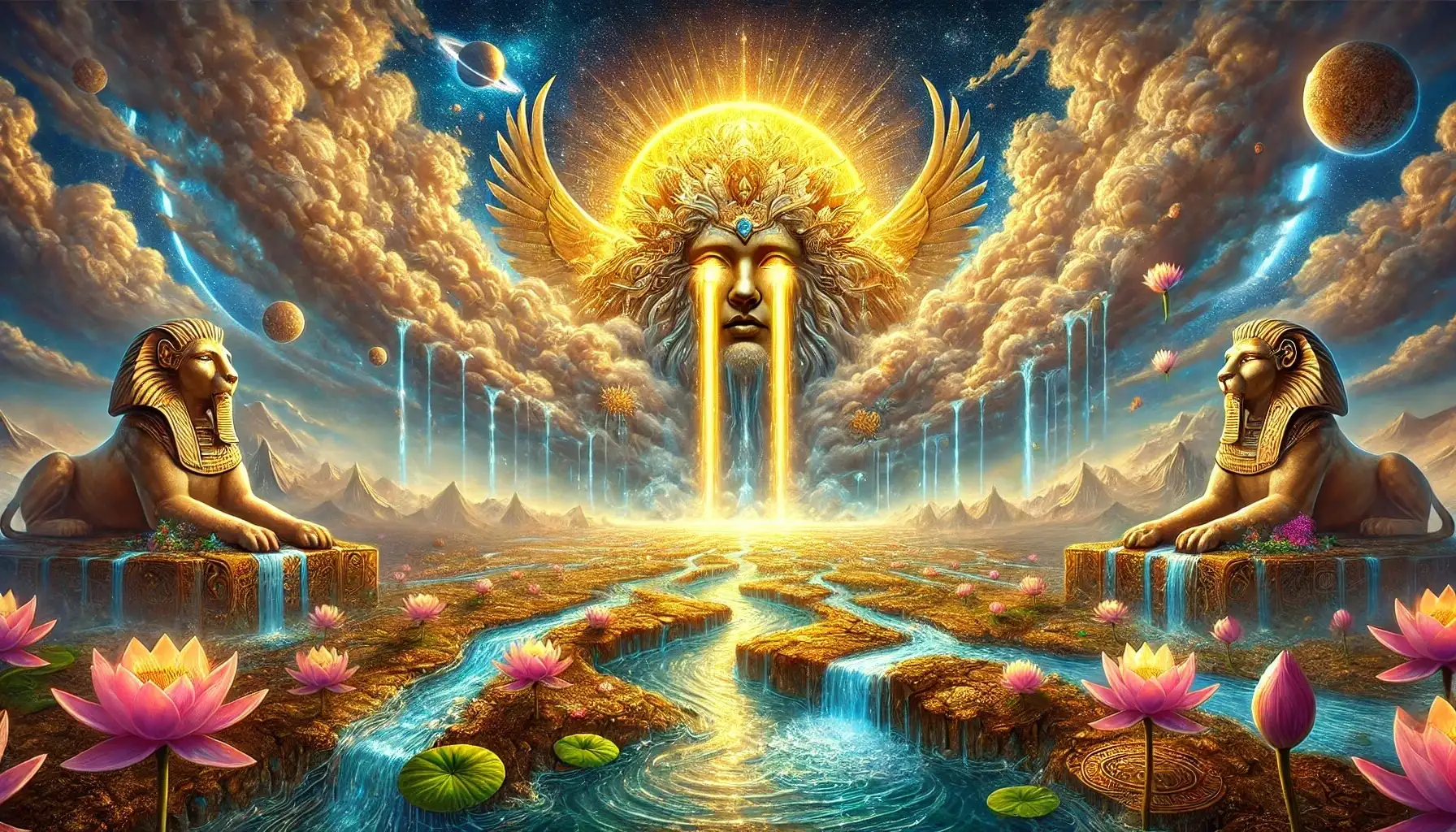The Divine Reign of Ra
In the dawn of the world, when the Nile’s waters first carved their path through the black earth, Ra, the sun god, reigned supreme over gods and mortals alike. His golden barque sailed across the heavens by day, bringing light and life to the Two Lands, and by night, it journeyed through the perilous Duat, the underworld, where he battled the serpent Apep to ensure the sun’s rebirth. Ra’s rule was eternal, his wisdom boundless, and his power unmatched. Yet, as the ages turned, a shadow crept into his divine heart. For though he was worshipped in every temple and his name was sung in every household, Ra grew weary. The weight of eternity pressed upon him, and the murmurs of mankind’s ingratitude began to sting his immortal ears.
The Rebellion of Mankind
In those days, humanity dwelled in the fertile embrace of the Nile, their lives intertwined with the cycles of the river and the will of the gods. But as generations passed, the hearts of men grew restless. They whispered against Ra, their creator, and plotted in the shadows. “Why should we serve him who grows old and feeble?” they asked. “His bones are silver, his flesh gold, and his hair lapis lazuli. He is no longer the invincible lord of the sky.” These words reached Ra’s ears, carried by the winds of discontent, and his divine heart burned with wrath. He summoned his Eye, the fierce and fiery goddess Hathor, and the council of the gods to his celestial palace.
The Wrath of the Eye
Ra stood before the assembled gods, his form radiant yet trembling with anger. “Mankind, whom I created from my tears, has turned against me,” he declared. “They conspire in darkness, their hearts filled with treachery. I will not endure their insolence.” The gods, awed by his fury, bowed their heads. But Ra’s Eye, the goddess Hathor, stepped forward, her form shimmering with the heat of the sun. “Lord Ra,” she said, “grant me your power, and I shall descend to earth and destroy those who dare defy you. I shall become the lioness Sekhmet, the devourer, and my jaws shall drink their blood.”
Ra, his heart heavy yet resolute, granted her request. “Go forth, my Eye, and let your wrath be swift. But take care, for I do not wish to annihilate all of mankind. Let some remain to remember my name and offer me praise.” Hathor nodded, her eyes blazing like twin suns, and she transformed into Sekhmet, the lioness of vengeance. Her roar shook the heavens as she descended to earth, her claws sharp as flint, her hunger insatiable.
The Bloodbath Begins
Sekhmet’s arrival was a storm of fury. She stalked the land, her golden mane aflame, her teeth tearing through flesh and bone. The rivers ran red with blood, and the air was thick with the cries of the dying. She spared none—neither the young nor the old, neither the guilty nor the innocent. Her rampage was relentless, her thirst unquenchable. The fields, once green with life, were now desolate, littered with the remnants of her feast. The gods watched from afar, their hearts torn between awe and horror, for Sekhmet’s wrath was a force beyond their control.
Ra’s Change of Heart
As the days turned to nights and the nights to days, Ra gazed upon the devastation wrought by Sekhmet. The land he had cherished was now a wasteland, and the cries of the few survivors reached his ears. His anger began to wane, replaced by a deep sorrow. “What have I done?” he murmured. “I sought to punish the wicked, but now the earth is barren, and my children are no more. This is not my will.” He called upon the gods once more, his voice heavy with regret. “We must stop Sekhmet before she destroys all of mankind. I cannot bear to see my creation undone.”
The Trickery of Beer
The gods, though fearful of Sekhmet’s rage, devised a cunning plan. They summoned Thoth, the god of wisdom, and instructed him to create a potion that would quell the lioness’s thirst for blood. Thoth, with his knowledge of herbs and magic, brewed a mixture of barley and red ochre, giving it the appearance of blood. He poured this concoction into seven thousand jars and brought them to the fields where Sekhmet roamed.
As the lioness prowled, her jaws dripping with gore, she came upon the jars. Believing them to be filled with blood, she drank deeply, her hunger driving her to consume every drop. But the potion was not blood—it was beer, laced with mandrake and poppy, and it coursed through her veins like a river of sleep. Her steps grew unsteady, her roars softened to purrs, and at last, she lay down upon the earth, her golden eyes closing in slumber.
The Transformation of Sekhmet
When Sekhmet awoke, her fury had subsided. The potion had not only quenched her thirst but also transformed her. She rose, no longer the fearsome lioness, but as Hathor, the gentle goddess of love and joy. Her heart, once filled with rage, now overflowed with compassion. She returned to Ra, her form radiant with peace, and bowed before him. “My lord,” she said, “I have done as you commanded, but now I see the folly of destruction. Let there be harmony between gods and men once more.”
The Restoration of the Land
Ra, his heart lifted by Hathor’s transformation, decreed that the land should be healed. He called upon the Nile to rise and flood the fields, washing away the blood and sorrow. The gods worked tirelessly, sowing seeds of life and blessing the earth with their divine touch. Slowly, the land began to bloom again, and the survivors of mankind emerged from their hiding places, their hearts filled with gratitude and reverence.
The Legacy of Ra’s Mercy
Ra, though still weary, found solace in the renewal of his creation. He appointed Thoth as his scribe, tasked with recording the deeds of gods and men, so that none would forget the lessons of the past. He also decreed that Hathor should be worshipped as a goddess of both love and vengeance, a reminder of the dual nature of divine power. And to mankind, he gave a final warning: “Honor the gods, and they shall bless you. Defy them, and you shall face their wrath. But know this—even in anger, there is mercy, and even in destruction, there is the seed of renewal.”
The Final Vision
As the sun set over the rejuvenated land, Ra boarded his golden barque and set sail for the horizon. The sky burned with hues of crimson and gold, and the waters of the Nile shimmered like molten metal. Hathor stood upon the riverbank, her form bathed in the dying light, and raised her hands in a gesture of blessing. The people, gathered along the shore, bowed their heads in reverence, their hearts filled with awe and gratitude.
But as the barque disappeared into the horizon, a single tear fell from Ra’s eye, landing upon the waters of the Nile. It rippled outward, a symbol of his eternal sorrow and love for his creation. And in that moment, the people understood the true nature of their god—a being of infinite power, yet bound by the weight of his own compassion. The tear became a lotus, its petals unfolding to reveal a single drop of golden light, a promise of renewal and hope.



